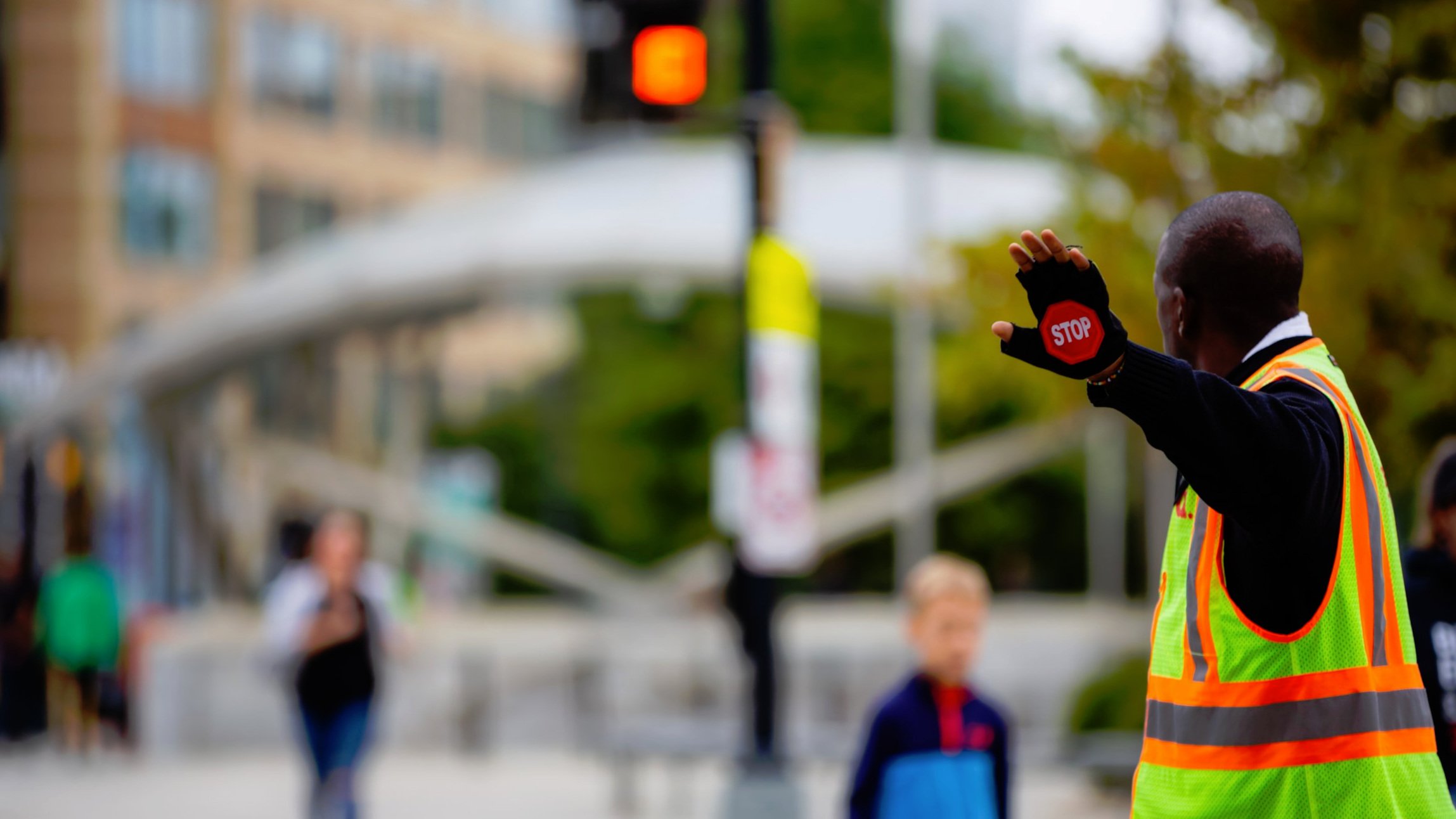New Year's: Police
School Crossing Guards Needed
The Middlesex Borough Police Department is currently accepting applications for School Crossing Guards. School Crossing Guards work approximately two to three hours per day. Equipment and training are provided. If you would like more information on becoming a School Crossing Guard, please contact Acting Sergeant Mark Melchiorre at (732) 356-1900, ext. 338.
Removal of ice and snow from sidewalks
Residents shall remove all snow and ice from all portions of sidewalks down to their natural surfaces. The removal snow and ice must be accomplished within 12 hours of daylight after the snow has fallen and/or the ice has formed. Municipal ordinance requires that you remove snow and ice from sidewalks. Also, you can help the dedicated men and women of the Middlesex Fire Department by clearing snow and ice from on and around fire hydrants. Ordinance # 360
Ice & Snow - Remove it Before You Go
Remember to remove all ice and snow from your vehicle before driving, especially from the hood, windows and roof. It’s the law in New Jersey! Motorists that fail to do so face fines of $25 to $75 for each offense, regardless of whether the ice and snow is dislodged from the vehicle. If flying ice or snow causes property damage or injury to others, motorists face fines of $200 to $1,000 for each offense. 39:4-77.1
Parking prohibited on Snow Covered Roadways
Whenever snow has fallen and the accumulation is such that it covers the street or highway, an emergency shall exist and no vehicle shall be parked on any street or highway or portion thereof. This prohibition shall remain in effect after the snow has ceased, until the street has been plowed sufficiently and to the extent that parking will not interfere with the normal flow of traffic. When forecasts suggest that snow will accumulate on our roadways, it is important to remove all vehicles from the roadways so that crews can clear the roads of snow and ice. Snowbound vehicles can choke roadways, preventing the passage of emergency vehicles and delaying the delivery of important - sometimes lifesaving - emergency services. Ordinance # 407
Depositing Ice and Snow in roads/ Removal of ice and Snow from handicapped parking
Do not deposit any removed ice and snow in public roads. Ice and snow must be removed from handicapped parking spaces within 48 hours of the snowfall. The law also requires that curb cuts for handicapped access be cleared within 48 hours. Businesses and residents with corner property please take special note. Ordinance # 359
Parking prohibited on Snow Covered Roadways
Whenever snow has fallen and the accumulation is such that it covers the street or highway, an emergency shall exist and no vehicle shall be parked on any street or highway or portion thereof. This prohibition shall remain in effect after the snow has ceased, until the street has been plowed sufficiently and to the extent that parking will not interfere with the normal flow of traffic. When forecasts suggest that snow will accumulate on our roadways, it is important to remove all vehicles from the roadways so that crews can clear the roads of snow and ice. Snowbound vehicles can choke roadways, preventing the passage of emergency vehicles and delaying the delivery of important - sometimes lifesaving - emergency services. Ordinance # 407
Depositing Ice and Snow in roads/ Removal of ice and Snow from handicapped parking
Do not deposit any removed ice and snow in public roads. Ice and snow must be removed from handicapped parking spaces within 48 hours of the snowfall. The law also requires that curb cuts for handicapped access be cleared within 48 hours. Businesses and residents with corner property please take special note. Ordinance # 359
Winter Driving Tips
Severe weather can be both frightening and dangerous for travelers. Winter storms, bad weather and sloppy road conditions are a factor in nearly half a million crashes and more than 2,000 road deaths every winter.
Get Your Car Serviced
Visit your mechanic for a tune-up and ask them to check for leaks, badly worn hoses, or other needed parts, repairs, and replacements.
Know Your Car
Read your vehicle’s manual to familiarize yourself with the safety features on your vehicle—such as antilock brakes and electronic stability control—and how the features perform in wintry conditions.
Plug It In
For electric and hybrid-electric vehicles, minimize the drain on the battery. If the vehicle has a thermal heating pack for the battery, plug your vehicle in whenever it’s not in use. Start your vehicle and preheat the interior before you unplug your vehicle in the morning.
Plan Your Travel and Route
Before heading out, make sure to check the weather, road conditions, and traffic. Don’t rush through your trip and allow plenty of time to get to your destination safely. And always familiarize yourself with directions and maps before you go, even if you use a GPS system, and let others know your route and anticipated arrival time.
Don’t crowd a snowplow or travel beside it
Snowplows travel slowly, make wide turns, stop often, overlap lanes, and exit the road frequently. However, the road behind an active snowplow is safer to drive on. If you find yourself behind a snowplow, stay behind it or use caution when passing.
SLOW DOWN. It’s harder to control or stop your vehicle on a slick or snow-covered surface.
STOCK YOUR VEHICLE. Carry items in your vehicle to handle common winter driving-related tasks and supplies you might need in an emergency, including:
Snow shovel, broom, and ice scraper;
Abrasive material such as sand or kitty litter, in case your vehicle gets stuck in the snow;
Jumper cables, flashlight, and warning devices such as flares and emergency markers;
Blankets for protection from the cold; and
A cell phone with charger, water, food, and any necessary medicine (for longer trips or when driving in lightly populated areas).
What to Do in a Winter Emergency
If you are stopped or stalled in wintry weather, follow these safety rules:
Stay with your car and don’t overexert yourself.
Put bright markers on the antenna or windows and keep the interior dome light turned on.
To avoid asphyxiation from carbon monoxide poisoning, don’t run your car for long periods of time with the windows up or in an enclosed space. If you must run your vehicle, clear the exhaust pipe of any snow and run it only sporadically — just long enough to stay warm.
Nixle Community Notifications and Alerts
Residents are urged to sign up to receive Nixle Alerts and Messages. Nixle allows the Police Department to send important, valuable community information directly to residents using the latest technology. Messages will be delivered by email, SMS/text message (cell phone), and over the World Wide Web. Notifications may include crime related alerts, traffic advisories and other relevant safety and community event information. Nixle also enables citizens to submit anonymous tips to the police department to aid in crime fighting efforts.
Information can be received online and via e-mail. Residents receive messages by cell phone as part of their text-messaging plan (otherwise standard text message rates apply). The system is simple to use and provides an easy sign-up process.
Register now to receive text messages: Text “MIDDLESEXPD” to 888777 to begin receiving SMS/text only
Register now to receive email alerts: https://local.nixle.com/register/ To learn more log on to www.nixle.com
Nixle’s Community Information Service is built exclusively to provide secure and reliable communications. Its authenticated service connects agencies to citizens in real-time, delivering information to residents.
Snowblower Safety TipsSafety Tips
Snow season is upon us and it’s time to dust off the snow blowers once again. Each year, thousands of people suffer serious injuries to their hands, fingers, and backs due to the improper handling of snowblowers. Injuries typically occur when the snow is heavy, wet or has accumulated several inches. Below are some basic safety tips to keep you and others from being injured.
Avoid wearing loose clothing. Loose pants, jackets and scarves can easily become tangled in the moving parts of a snow blower.
Wear sturdy footwear with good traction. Appropriate footwear will help to prevent slip and fall injuries. Consider using shoe or boot grippers, such as ICEtrekkers. These are also referred to as ice cleats or spikes; no matter what you call them, they will reduce the risk of a slip and fall.
Stay focused. Pay close attention to the task at hand and refrain from the use of medication, drugs or alcohol.
Start the machine outside. Do not start your snowblower in a garage or shed. Gas-powered snowblowers produce dangerous carbon monoxide
Protect your ears. Wear ear plugs or other hearing protection. Most gas-powered snowblowers are loud and can cause hearing damage.
Think about where the snow is blowing. Never direct the discharge chute toward people, traffic, or areas where damage can occur.
Keep children indoors. Children enjoy playing in the snow but hold off until after you are done snow blowing.
Pace yourself. Although snowblowers are safer and faster than shoveling, you should still take rest breaks.
Clogged Snowblowers
When dealing with snowblowers, hand or finger injuries are most common, including amputation. This typically occurs when the user tries to clear a clogged auger or discharge chute with their hands. Follow these tips to stay safe from the dangers of a clogged snow blower.
To keep the snow blower from clogging:
Work at a brisk pace. When the blade moves faster, the snow is less likely to stick.
Consider snow blowing several times during a wet or heavy snowfall.
Spray the blades and chute with cooking oil spray.
If the snowblower becomes clogged:
Turn off the engine OFF!
Make sure blades have stopped rotating before trying to clear the clog.
Use a clearing tool or stick to clear the clog.
Never use your hands or feet. A clogged auger will have residual energy that can trap your hands even when it is turned off!
Keep all shields in place.
Always keep your hands and feet away from all moving parts.
Report Streetlight Outages
To report a problem with a Streetlight, please call 1-800-436-PSEG (7734). Or, login to “My Account“ at www.pseg.com/myaccount.
Click on Streetlight Outages
Then click on Report Streetlight Outage.
The following information will assist us in expediting repairs:
Is the light off at night or on during the day?
Is the fixture or pole damaged or missing?
Street and nearest cross street
Nearest house number
Pole number
Your name and phone number
Report a Traffic Safety Concern
We ask that you support our Safe Roads Initiative by obeying all traffic laws at all times. Please report any non-emergency traffic concerns to:
Middlesex Police Department – (732) 356-1900 ext. 235, or trafficsafety@middlesexpd.com
We’re your Middlesex Borough Police Department!
Like us on Facebook • Follow us on Twitter • Follow us on Instagram






